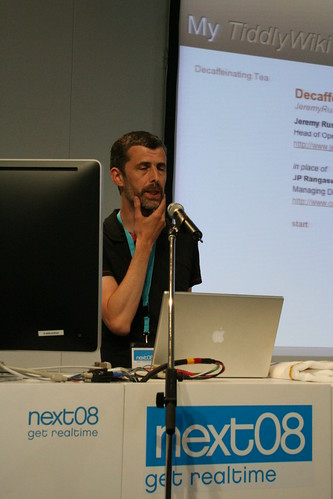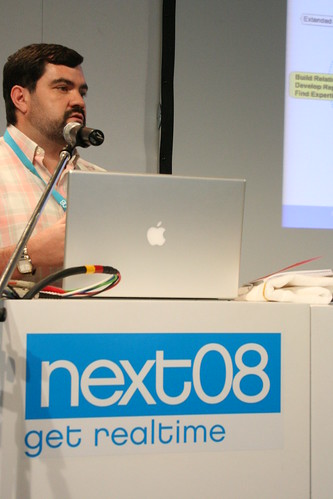First up: Jeremy Ruston of British Telecom.
„Decaffeinating Tea, what’s that supposed to mean?“, you might be asking yourself. (I sure did.) What’s hiding behind the slightly odd title is the question of how individuals are treated, and how they function, in large corporations. Most importantly, what has changed for employees as a person and for the enterprise in what today we call Enterprise 2.0?

Trust in enterprises has always been a problem: As a cog in the machine, the employee has never been faced with too much trust by their enterprises. In the digital age, things got even worse, just think of the stories you’ve heard about emails where colleagues have cc’d (or even bcc’d) the boss for strategic reasons, i.e. because they didn’t trust their colleagues.
Time, and how people spend it in their jobs, is another issue. Good question raised by Jeremy: If Google’s (or any other company’s for that matter) employees spend 20% of their time researching on stuff they’re personally interested in, what do they work on the other 80% of their working time on?
Teenagers today grow up with an incredibly high media and technology awareness and the relevant skills. Those Digital Natives really know their tech, and their web 2.0 tools. How can enterprises exploit this, or at least not scare those future employees away? After all, if a digital native isn’t able to apply his skills and knowledge in his workplace because corporate policies and infrastructure won’t allow the tools and practices, it’s a lose-lose situation: The employee will be frustrated, the employer can’t get the maximum value for their money.
So how does British Telecom harness the Web 2.0 generation? According to Jeremy Ruston, BT has been pretty early on in the adoption curve. Just to give an example: Use of Facebook was encouraged early on.
Next up: Luis Suarez Rodriguez of IBM.
IBM, if Luis Suarez is indication, is pretty far ahead on the adoption curve. „Collaboration allows us to tap into the power of people“ says one slide which analyzes how we ask out peers and friends for advice in one-on-one situations. How to harness this very mechanism and make it scale to larger groups is one of the big challenges being tackled in our days.

Now it would be great to not only explicitly ask for advice, but to also collaborate more implicitly. Do I really have to write an email to find out which music album to buy as a birthday gift? Probable not – if you manage to tap into smart communities. Technology can enable and foster this kind of exchange, it can help foster relationships between individuals, thus creating a community. It’s people, not data. That’s the very core of online collaboration.
Email is obviously not the way to go. (Challenge: Ask Stowe Boyd about email!) So how can we harness the power of communities? Trust is a key issue: Without trust you cannot anything done. The main challenge, though, is to shift from a controlled, regulated environment to a dynamic environment that fosters spontaneous collaboration – forget org trees! Rodriguez’s message is clear: Email is too inflexible, go for Wiki-style collaboration. (With this presentation, he could’ve easily passed at a Barcamp, too – they’d have loved him.)